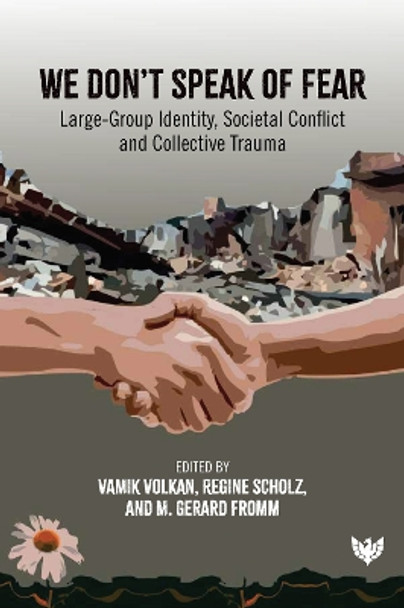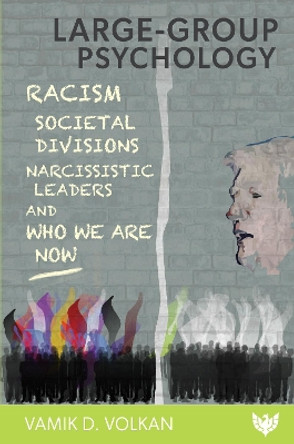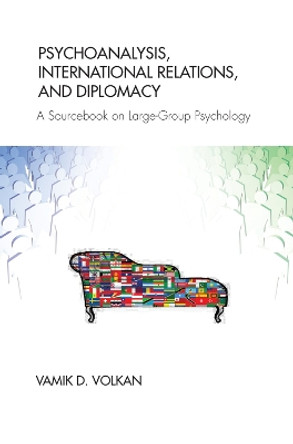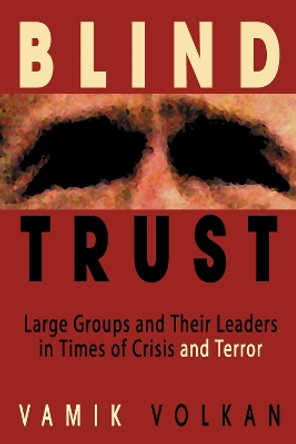Description
With contributions from Lord John Alderdice, Deniz Aribog an, Abdulkadir Cevik, Senem B. Cevik, Coline Covington, Robi Friedman, David Fromm, M. Gerard Fromm, Hiba Husseini, Aleksandr V. Obolonski, Ford Rowan, Regine Scholz, Edward R. Shapiro, Vamik D. Volkan
The International Dialogue Initiative (IDI) is a private, international, multidisciplinary group comprised of psychoanalysts, academics, diplomats, and other professionals who bring a psychologically informed perspective to the study and amelioration of societal conflict. It aims to provide a reflective space to enable an understanding of how the emotional and historical background of hostile relations - often related to trauma - is being experienced in the present. By doing so, antagonists can overcome resistances to dialogue and facilitate the discovery of peaceful solutions to intergroup problems. This book brings together key members of the IDI to present the theory and practice of the important work they do. At its heart, the book holds the idea that, while traumatic experiences may happen to an individual or a family, they also affect society and large-group identity over long periods of time. In that way, trauma plays out between generations and between countries.
The book is divided into three parts: theory, application, and methodology. Trauma is the key thread running throughout and the distinguished contributors investigate healing, dehumanisation, memory, the pandemic, war, terrorism, identity, culture, the law, justice, and religion, among many other fascinating topics. The authors bring in case studies from all over the world, including the United States, Northern Ireland, Russia, Israel, Turkey, Germany, Egypt, and Palestine. To make sense of these, they draw on a wide range of approaches: group relations theory, group analytic theory, psychoanalysis, large-group psychology, psychodynamic theory, psychology, economics, sociology, political science, history, journalism, and the law, to name but a few. This must-read book brings theory to vivid life and brings hope that our fractured world can learn to heal.
About the Author
Vamik Volkan, MD, DFLAPA, received his medical education at the School of Medicine, University of Ankara, Turkey. He is an emeritus professor of psychiatry at the University of Virginia, Charlottesville and an emeritus training and supervising analyst at the Washington Psychoanalytic Institute, Washington, DC. In 1987, Dr Volkan established the Center for the Study of Mind and Human Interaction (CSMHI) at the School of Medicine, University of Virginia. CSMHI applied a growing theoretical and field-proven base of knowledge to issues such as ethnic tension, racism, large-group identity, terrorism, societal trauma, immigration, mourning, transgenerational transmissions, leader-follower relationships, and other aspects of national and international conflict. A year after his 2002 retirement, Dr Volkan became the Senior Erik Erikson Scholar at the Erikson Institute of the Austen Riggs Center, Stockbridge, Massachusetts and he spent three to six months there each year for ten years.
In 2006, he was Fulbright/Sigmund Freud-Privatstiftung Visiting Scholar of Psychoanalysis in Vienna, Austria. Dr Volkan holds honorary doctorate degrees from Kuopio University (now called the University of Eastern Finland), Finland; from Ankara University, Turkey; and the Eastern European Psychoanalytic Institute, Russia. He was a former president of the Turkish-American Neuropsychiatric Society, the International Society of Political Psychology, the Virginia Psychoanalytic Society, and the American College of Psychoanalysts. Among many the awards he received are the Nevitt Sanford Award, Elise M. Hayman Award, L. Bryce Boyer Award, Margaret Mahler Literature Prize, Hans H. Strupp Award, the American College of Psychoanalysts' Distinguished Officer Award for 2014, and the Mary S. Sigourney Award for 2015. He received the Sigmund Freud Award given by the city of Vienna, Austria in collaboration with the World Council of Psychotherapy. He also was honoured on several occasions by being nominated for the Nobel Peace Prize with letters of support from twenty-seven countries. Dr Volkan is the author, co-author, editor, or co-editor of more than fifty psychoanalytic and psychopolitical books, including Enemies on the Couch: A Psychopolitical Journey through War and Peace. Currently Dr Volkan is the president emeritus of the International Dialogue Initiative (IDI), which he established in 2007. He continues to lecture nationally and internationally.
Regine Scholz, Dr. Phil., is training director and Fellow of the International Dialogue Initiative, and a group analyst. Since 1987, she has worked in private practice, specializing in individual and collective trauma. As board member (2010-2017) of the Group Analytic Society International (GASI) she organized its international summer schools (Belgrade 2013, Prague 2015, Athens 2016). She also is the co-organizer of five conferences so far on the heritage of Auschwitz, "Voices after Auschwitz". A founding member of the German Society for Group Analysis and Group Psychotherapy (D3G), Dr. Scholz is a supervisor and training analyst of D3G and member of the editorial board of the journal Group Analysis.
M. Gerard Fromm, PhD, is a distinguished faculty member of the Erikson Institute of the Austen Riggs Center and a fellow of the American Board and Academy of Psychoanalysis. He was the first Evelyn Stefansson Nef Director of the Erikson Institute, and directed the therapeutic community program at Riggs for many years before that. Dr Fromm has taught at, and consulted to, a number of psychoanalytic institutes across the country and has served on the faculties of the Yale Child Study Center and Harvard Medical School. He is president of the International Dialogue Initiative, an interdisciplinary group that studies the psychodynamics of societal conflict. He is also a past president of the International Society for the Psychoanalytic Study of Organizations and of the Center for the Study of Groups and Social Systems in Boston. Dr Fromm has directed or served on the staff of group relations conferences in the United States, Canada, Europe, and Israel. In addition to an independent practice of clinical and organisational consulting, he is also a partner in College Health and Counseling Services Consulting. Dr Fromm has presented and published widely, including the edited volumes Lost in Transmission: Studies of Trauma across Generations; A Spirit That Impels: Play, Creativity and Psychoanalysis; and (with Bruce L. Smith) The Facilitating Environment: Clinical Applications of Winnicott's Theory. He is also the author of a book of clinical papers called Taking the Transference, Reaching toward Dreams: Clinical Studies in the Intermediate Area.
Reviews
'In We Don't Speak of Fear, Vamik Volkan, Regine Scholz, and M. Gerard Fromm, with the benefit of their combined experience in conducting IDI conferences (a few of which I have attended and greatly appreciated), have carefully selected articles from well-recognized experts and brought to the field of psychoanalysis an excellent book. It should be considered a must-read for everyone interested in large-group identity, trauma, and global conflict.'
-- Vaseehar Hassan, PhD, Board Member, Bank Kerjasama Rakyat Malaysia; Senior Associate, Kets de Vries Institute; Executive Coach and Practicum Supervisor, INSEAD'At this moment in time, when tribalism and polarization are rampant, with humanity split into thousands of splintered groups, and the very planet itself threatened, this compelling book, unlike much of the conflict resolution literature, addresses the deep, frequently unconscious roots of conflict, not just the symptoms. With great understanding and compassion, the various authors explain how the profound, historic wounds of shame and humiliation and fear of loss of identity keep so many communities divided and imprisoned. At the same time, they offer a much-needed vision for how human beings might heal these deep wounds and begin to live on the presumption that we are one human family, despite our differences. We Don't Speak of Fear is a wonderful contribution to the global family and deserves to be read, pondered, and decisively acted upon.'
-- Hugh O'Doherty, Founding Member, the Leadership and Peacemaking Global Network'After the Iraq war, politicians talked about power sharing amongst the Sunni and Shiite militias. A worthy political aim but one that did not recognize the psychological impact of the different religious sects having killed each other in the conflict and of the mistrust, suspicion and fear that continued to loom large. This book goes a long way toward addressing psychological states of mind post-conflict and recognizes the need, if there is to be political progress, to address the trauma of war and to create safe spaces to do this. I highly recommend this book for its sensitivity, thoughtfulness, and in-depth thinking, expressed by a rich array of writers.'
-- Gabrielle Rifkind, Author, 'The Fog of Peace: How to Prevent War'; Director, Oxford Process'With this unique book, the International Dialogue Initiative and its authors are offering a much-needed helping hand to humanity by illuminating how large-group conflicts can be effectively mediated. Both theory and culturally diverse practice illustrate a multidisciplinary approach, pioneered by Vamik Volkan in 1977, to maximize psychological understanding of the psycho-historical origins of conflict and the possibilities of reaching peaceful conflict resolutions. As a father of two young children, I find that this book and the call for what is described as "depressive" leadership capabilities could not have been timelier.'
-- Elco Schwartz, Executive Coach/Consultant; PhD Candidate in Governance/Organizational Behaviour, Amsterdam Business Research Institute'We Don't Speak of Fear presents a profound psychoanalytic approach to understanding large and small group conflict, an approach that requires speaking of fear. Editors Vamik Volkan, Regine Scholz, and M. Gerard Fromm, and their interdisciplinary group of psychoanalytic thinkers, recognize the courage it takes to identify and express the feelings that accompany overlapping individual and collective trauma, whether current or transgenerational. The destructive impact of humiliation and shaming, the allure of authoritarian leadership in the context of fear and despair, and the complex nature of dehumanization are just a few of many clearly presented insights into intractable conflict. In the current climate of rampant polarization, this book is a must-read for anyone working with groups with the goals of constructive collaboration and adaptive change.'
-- Harriet Wolfe, MD, President, International Psychoanalytical Association'This book explains brilliantly not just how conflicts arise, but why. Using their own first-hand experience and that of others in the field, the authors introduce the reader to a psychodynamic perspective of why fear is so often replaced with anger. [...] This carefully edited book leads the reader through the fluctuations in 'othering' of recent history in a style that is accessible to therapist and lay reader alike.'
-- Andy Cottom, psychodynamic psychotherapist with a background in warzones, New Psychotherapist, Autumn 2023Book Information
ISBN 9781912691098
Author Vamik Volkan
Format Paperback
Page Count 320
Imprint Phoenix Publishing House
Publisher Karnac Books
Weight(grams) 528g
Dimensions(mm) 229mm * 152mm * 19mm






